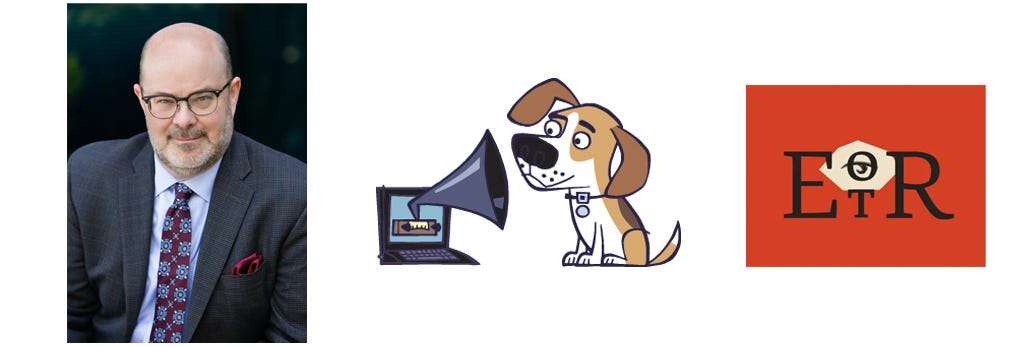Damon is a political writer who recently launched his own Substack, “Eyes on the Right.” He’s been the editor of First Things and a senior correspondent at The Week, and he’s the author of The Theocons and The Religious Test. Back when we were both at Newsweek / Daily Beast, he edited my essays, so we’ve been friends for a while. We also both belong to the camp of conflicted moderates.
You can listen to the episode right away in the audio player above (or on the right side of the player, click “Listen On” to add the Dishcast feed to your favorite podcast app). For two clips of our convo — on the impossibility of predicting politics, and on the question of whether DeSantis can dethrone Trump — pop over to our YouTube page.
Other topics: the mental illness of our mothers, Leo Strauss and his acolytes, Socrates, the state of liberal democracy, Robert Bork, Harvey Mansfield, the essential need for doubt, how we both misjudged the red wave, Kari Lake, Biden’s shortcomings and which Democrat could replace him in 2024.
Browse the whole Dishcast archive here. From a listener on last week’s episode with Fareed Zakaria:
It was a fascinating conversation. Like Fareed, I also grew up in India, but went to grad school here and settled in the United States. I am still overwhelmed by a bunch of emotions when I read about the Sunak story. That photo of him striding into No. 10 is one for the ages! I can never forget it. For someone of Indian heritage strutting right into the very building where every decision about colonized India was made ... the symbolism of it I can’t erase from my mind. It’s a testament to how far the UK itself has moved on, with not much fuss made in the press about its huge symbolism.
On the topic of India’s love-hate relationship with the Brits, as Fareed said, “It’s complicated.” Most of the current generation of Indians had no direct experience of colonial rule. The early leaders of India, Gandhi, Nehru, Patel — all of them went to school in England, and after Independence, they were more of the mindset of “Let’s move on. No more stewing over the past. If anything, if there was any good in their institutions, let’s copy them.” That’s why post-independence Indians did not grow up with any serious rancor toward the British.
Even the US was a British colony. I don’t know how long it took for the US and the UK to mend their relationship, but nowadays they get along famously!
The BJP, under Modi, in the name of muscular nationalism, is trying hard to arouse some animosity and bitterness that never particularly took root — and that Nehru and Gandhi tried to move away from. No telling what the future holds.
Another fan of the episode talks Ukraine:
This was another great podcast. Thank you!
With regards to Ukraine, you ask, “How does this end?” One model may be a kind of Congress of Vienna that helped to settle the Napoleonic wars. Yes, this is “out there” as an idea, but it’s a lot better than a war that runs for years to come; or than the West losing; or than moving to nuclear escalation. So it may be the least-worst option, which in a war is fairly good.
It’s one of the few models that has worked in situations other than surrender. Also, there is a wider arc of geopolitical issues that need to be settled, as de facto and de jure control do not coincide in the region — from Transnistria to Turkey’s southern rim. These conflicts are all unique. But they share the feature that there are few win-win scenarios for long-term resolution. This in turn, would offer the chance to transcend bilateral deadlocks through multilateral swaps.
Talleyrand, France’s chief negotiator, summed up the core principle of the Congress of Vienna. For a settlement to work, he is reported to have said, “Everyone needs to leave unhappy, and having had to make sacrifices. It is from these partial sacrifices that must come to life the agreement of all, the greater good.”
The West, likely, could not lead such a settlement, as we are uneasy with such a style of making politics now. But perhaps Turkey could position itself in this way. There are some indications that they are indeed contemplating such a role. There are, of course, lots of complications but trying unusual ideas is a lot better than years or war, or a bigger conflagration.
A quick note from a “former US Navy Officer and military history buff”:
Loved the interview with Fareed Zakaria. He does have the perfect response to the Obama statement that you keep quoting (that America will never care as much about Ukraine as Russia does). I would add that Poland and the Baltics also care a lot about what happens to Ukraine. They all know that if Putin succeeds in reconquering Ukraine and reintegrating it in the revived Russian Empire, they are next.
(Also, you should tell Fareed that the German High Seas Fleet did leave port and fight during WWI: the Battle of Jutland. It was the largest battleship battle in history.)
A listener recommends a future guest for the pod:
I wonder if you’ve ever run across Robert Sapolsky, the famed (and beloved) Stanford neurobiologist and primatologist. His book, Behave: The Biology of Humans at our Best and Worst, intersects with many of your topics of interest, and offers a staunchly anti-reductionist review of human behavior. Would love to see you integrate biology in your discussions of contemporary topics.
Next on the Dishcast will be Robert Draper to discuss his new book, Weapons of Mass Delusion: When the Republican Party Lost Its Mind. Then we’ll talk to Alyssa Rosenberg, Glenn Loury, Kyle Harper and Carl Trueman, author of The Rise and Triumph of the Modern Self. Trueman and I will almost certainly debate the impact of marriage equality over the past decade. Along those lines, a reader writes:
Hope you’re doing well! Just wanted to reach out to recommend that you listen to Joe Rogan’s podcast with Matt Walsh that dropped today. It’s three hours but very worth it, start-to-finish. The final hour is actually the most interesting one, where Walsh argues for the holdout position of opposition to marriage equality while acknowledging its inevitability, and Rogan gives a stirring defense of equal rights to marriage that honestly got me emotional at times.
It’s very relevant to issues related to woke ideology, the capture of the LGBTQIAWXYZ+ movement by postmodern nonsense, and the tenuous alliance between good old-fashioned classical liberals like Rogan or yourself on the one hand, and borderline-Christianists like Walsh who also happen to see reason on this specific issue.
I did listen to some clips. Walsh’s position, however, still hasn’t come to terms with the distinction between “civil marriage” and “religious marriage.” For Walsh, the laws should reflect the Catholic understanding of procreative complementarity. But in a secular, pluralist society, you’d need a theocracy to enforce this.
And if you tried to wind back the clock in a democracy, divorce and contraception would also have to be illegal (they both violate Catholic doctrine for the exact same reason as same-sex couples). And if procreation defines marriage, then childless marriages would also have to be invalid, as well as marriage for the infertile. You can makes these theoconservative arguments alongside opposition to same-sex civil marriage and be coherent. Or you can focus on same-sex marriage alone — i.e. the pre-2015 situation — and rightly be called out for targeting a tiny gay minority rather than the massive heterosexual majority. Maybe I should invite Walsh on the Dishcast to talk this through.
Thanks as always for the great dissents and other commentary; you can always send yours to dish@andrewsullivan.com. For a big compilation of reader dissents over my midterm angst over Biden and the Democratic left, and a defense of their record, click here.














